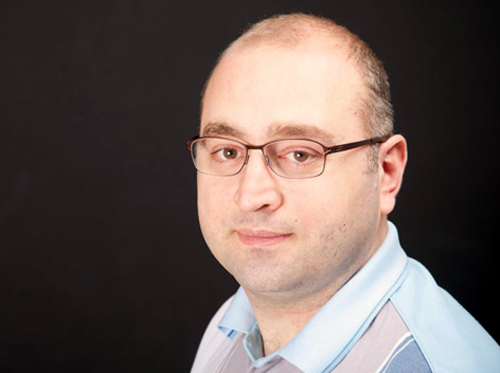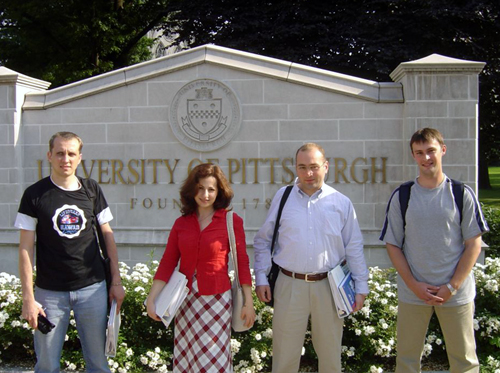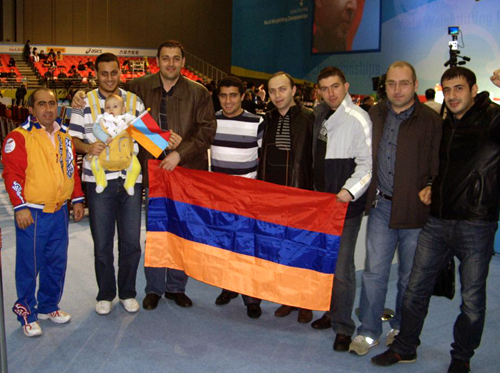Mediamax continues "50 Global Armenians" special project. Today we present you Karen Ispiryan who has lived in the South Korean city of Suwon until recently and worked in Samsung Electronics corporation.
Karen Ispiryan was born in Yerevan in 1975. In 1997, he graduated from the Department of Informatics and Applied Mathematics of the YSU and in 2002 - the graduate school of the Institute for Informatics and Automation Problems of the Armenian National Academy of Sciences taking a degree in cryptography. In 2005, Karen Ispiryan studied in the Carnegie Mellon University.
In 1993-96, he worked in the engineering bureau at the Armenian Defense Ministry in Yerevan. In 1996-2008, he was a cryptographer and programmer in the Armenian branches of foreign IT companies and worked in Samsung Electronics corporation as a design-engineer of security systems in South Korea in 2008-2011.
Karen Ispiryan closely cooperated with the authors of SAFER+ and SAFER ++ cryptoalgorithms, took part in the process of their development and defended his PHD thesis based on those results. SAFER+ is used in Bluetooth widely spread standard. Karen Ispiryan currently holds the status of an independent expert and works at a number of projects.
"Back in school years, I was happy to meet with a talented person, physicist and astronomer Avetik Grigoryan. When we got acquainted, he worked in the Byurakan observatory. Avetik is the founder of the Young Astronomers' Club of Armenia and many of its members are now prominent figures in the IT sector. It mainly aimed at uniting talented and inquisitive pupils forming an atmosphere to reveal their creative skills as much as possible. We conducted various astronomic metrologies which required difficult mathematic calculations. Avetik wrote computing programs in the FORTRAN language and it was there that I first got acquainted with programming. I couldn't do programming yet but I already understood what interesting, powerful and promising work it is. 
Members of the Young Astronomers' Club of Armenia during a conference.
Photo from Karen Ispiryan's personal archive
In 1992, I entered the Department of Informatics and Applied Mathematics of the YSU. It turned out very soon that only the second part of the name of the department reflects the things I was going to learn there. There were excellent specialists in the university and we endlessly studied mathematics, mathematics and again mathematics. There wasn't practically a single subject on informatics.
I understood that I should quickly set to a practical job in the programming sphere.
I was a second-year student when I learnt that the Defense Ministry and a number of engineers started a number of projects aiming to help newly-established Armenian Armed Forces. Avetik Grigoryan was involved in the projects and invited me to join him. It was a real gift of fate as the objects of defensive significance were supplied with permanent electricity while Armenia was immersed in darkness. Working in one of them, I got the chance to be useful to the motherland and simultaneously deepen my knowledge in programming. In the second half of 90-s, when Armenia already could purchase arming from other countries the majority of the programs were stopped, unfortunately.
The first private company where I started working in 1996 was HPLA, affiliate of American HPL, targeted for foreign customers. Here I did general Windows programming and got acquainted with the peculiarities of commercial programming for the first time.
How cryptography came to Armenia
In 1971, prominent academician Rom Varshamov organized a large scientific conference in Armenia devoted to the theory of cryptography with participation of the most eminent mathematicians of the world. Many famous figures attended the conference but the participation of prominent American scientist James L.Massey, pupil of legendary founder of informatics Claude Shannon, was the most important thing. He was interested in a number of brilliant works of Armenian scientists and that's why later he made a proposal of cooperation with Varshamov's pupils - academician Gurgen Khachatryan and Candidate of Sciences Melsik Kyureghyan.
In the first half of 90-s, it appeared that DES (Data Encryption Standard) system used till that time is not capable of ensuring the required security level any more. Specialists of the sphere including Massey, Khachatryan and Kyureghyan started working over the solution of the problem. This group of scientists closely cooperated with the American Cylink company which is one of the leaders of the sphere. In 1997, I was offered to join them and work over this utterly interesting task. The tasks were very difficult: we all had to make greatest efforts for it. In the same 1997, a contest of developing a new cryptoalgorythm, AES (Advance Encryption Standard), was announced and we introduced the SAFER+ system. 
Karen Ispiryan in the period of working over SAFER+/SAFER++ (1999.)
Photo from Karen Ispiryan's personal archive
Though the system didn't win the contest, it became one of the cryptoalgorithms applied in Bluetooth standard. It was a very pleasant surprise for us. It's always pleasant to realize that results of your work are recognized and applied in millions of devices. Then we participated in NESSIE (New European Schemes for Signatures, Integrity, and Encryptions) European contest presenting SAFER++ cryptoalgorithm there. As a result of the works, Block ciphers family was created which is currently widely used across the globe. Bytes shuffling is one of the most important components of the algorithm which Massey decided to call "Armenian Shuffling". It was the first time when the name of our country appeared in relation with algorithms of such a high class. That was the way James Massey decided to express his gratitude toward Armenian scientists.
In this period, we did interesting jobs over various cryptosystems, for instance, projecting of a system based on elliptic curves but the development of SAFER was the most significant one. As to me, it was finally shaped after I defended my PhD thesis and the overwhelming part of it was dedicated to SAFER+/SAFER++ systems.
Need for new knowledge and discoveries
In 2004, after 7 years of working in the cryptography I decided to change the sphere. Fortunately, I have already managed to come across with all the possible types of tasks and needed new knowledge and discoveries by that time.
At that time, a branch of American CQG company developing software for financial markets and international stock exchanges platforms opened in Armenia. They required high programming standards as the price of errors in the finance sphere is very high. The sphere and company where I was recruited after passing a difficult interview proved very interesting to me.
CQG strived to meet highest standards of software development and it sent several new associates from Russia, Ukraine and Armenia (including me) to retraining in the Carnegie Mellon University to this end.
Karen Ispiryan in the Carnegie Mellon University with the participants of trainings including his colleagues from CQG
Photo from Karen Ispiryan's personal archive
After finishing the training and passing the qualification exam, I was granted the university's license for teaching and applying the knowledge in companies. It was an excellent school for me where I learnt what is the development of a full software product. Specialists who graduated from post-Soviet universities are opt to overestimate the value of only technical solutions and underestimate the rest of the components of software development. As a result, program development is often perceived as a sequence of technical solutions and often brilliant technical ideas are dissipated and the promising projects just sinks.
Samsung found me
I worked in SQG for over 3.5 years and in 2008, Samsung found me. The corporation needed experienced specialist in the security sphere and it was recommended to turn to me. At first, I was offered to work in Moscow but then during the interview I was suggested to move to Korea.
It's SAMSUNG Digital Media Center 40-storey skyscraper in the city of Suwon (South Korea) where Karen Ispiryan worked
Photo from Karen Ispiryan's personal archive
I didn't expect it at all and I thought over for some time - to go or not to. Later it turned out that some of my friends from Armenia already work in South Korea and they told me "go" though that "go" was with some reservations: they told me the country was wonderful but there were a number of peculiarities which I would have to put up with.
Korea is a different planet
As compared to Armenia, South Korea is not just a different world but a different planet. During the first week, the "recruits" underwent a Crash Course for us to be able to somehow get oriented. The main warning in the Crash Course was that over the first months, we are sure to experience a cultural shock, that means that things we would have to be tolerant to.
For instance, during the Crash Course we were told that Koreans shun directly express the refusal. They try to explain to us in different ways that they do refuse you but they don't utter "no". Over the first month, I didn't figure out the senses of the answers and I made one of my Korean colleagues say "no" to me. I am very sorry about it as I felt he found himself in a very tough situation. I should have to learn to understand the context of their words. 
Karen Ispiryan in Samsung with Chinese participants of Crash Course
Photo from Karen Ispiryan's personal archive
Their attitude toward time was another problem. Fancy an evening, 20:00, and you have a task from a supervisor. A European can refuse doing the extra job saying that he will do that tomorrow. A Korean can't refuse doing the task - he will continue working till late at night if necessary. Even if the task can't be accomplished he should show that he did his best, otherwise he will get a severe reprimand from his boss. Overall, according to their labor culture, if the boss sits at work the associates should also sit there and Korean managers often stay in the office till late at night. Exceptions may be applied to foreigners in case the manager is not a man with ossified views. Fortunately, I had the chance to work 8 hours a day and decide on my own whether to continue working or leave it till next day.
The office hierarchy is based on age parameters. The older associate leads the younger and the opposite is almost impossible. Respect toward the higher-ranked is expressed by a bow, "the depth" of which depends on the status of the man. Once I saw how one young associate kept bowing right and left over the whole day. The sense of his actions was that he considered himself a team member and treated everyone as older associates.
Overall, the idea and notion of "team" are of a great importance to Koreans. It's still a problem in Armenia which every leader should try to resolve. The problem was settled in Korea by the culture. People feel they make part of a team and don't conceive themselves outside of it. When somebody leaves the company after working for 1-2 years in the team, you may see moving and sentimental scenes of saying good-bye to the associate.
It was not that hard to adapt. I should just demonstrate elementary respect toward the people which Armenia often lacks. I think it's one of the reasons hindering quick development of our society.
Fortunately, my team was to some extent familiar with the Western working style and it was easy to adjust in that regard. It was more difficult for those foreigners who joined the team of Koreans exclusively leaded by a Korean with a stereotype mindset. Some people who faced such situations couldn't adjust and they quickly left Korea.
When I first requested for being given my 2.5 weeks of vacation it was my Korean colleagues who underwent a cultural shock. They didn't just fancy one could not come to work for more than 5 days.
The community work days which we already forgot about bear a permanent character there. The team gathers leaded by a man holding a high post, for example, Vice President, and they start beautifying any territory.
Samsung from inside
Security wasn't a priority for Samsung before. The company produced equipment with relatively simple functional capacities. But significant changes have taken place over the recent years. In fact, modern TV sets and phones are already computers with a wide variety of options. They allow connecting the device to the internet and having an access to various services. All this leads to issues related to security and data protection.
Karen Ispiryan with his team in Samsung
Photo from Karen Ispiryan's personal archive
I was happy to join Samsung in the period when the security systems were only being developed. From the very first days, I was involved in the job and made my own contribution to the process. At first, I developed and implemented various subsystems on my own such as Secure Storage and Common DRM agent. Then I became a developer-architect of program security systems of Samsung TV sets and Bly-ray players. I managed to initiate and implement several important and promising projects. One of them, “Binary and Source Code Level Obfuscator”, was so successful and promising that it was applied in the software of various devices released by Samsung.
I constantly made suggestions of introducing innovations in Samsung. At the initial stage, though I tried to prove their meaning and purpose based on the facts my offers were hardly accepted. The leadership was in the first place interested who gave similar solution in the world and if nobody did it in the world before they were very skeptical about it. Later, when I gained enough respect and trust my offers were accepted and implemented with great interest.
Samsung rhythm is extremely aggressive and it's aimed at yielding a quick result. It has its positive sides and Korea owes its success to this working style as well. But it's very hard to find time for calm reflections in such an atmosphere and it hinders development of creativity culture and independent thinking.
Competition was the reason why the corporation started finding serious scientific sources for development and I knew they could find them in Armenia that's why I offered Armenia as an option worthy of attention. At first, they were skeptical about the offer as they didn't know anything about Armenia. The fact that back in 70-s Armenia produced computers and the republic took leading positions in a number of scientific fields caused surprise and interest among the Koreans. Eventually, I managed to bring some of the company's projects to Armenia. One of them was successfully implemented in the American University of Armenia. One more projects are being implemented.
Samsung representatives visited Armenia recently and they currently study prospects of the long-term cooperation with our country.
Key to Armenia's success
Educated, open-minded and intelligent young people are the key to Armenia's success. To this end, we need quality educational system and highly-skilled and experienced specialists but unfortunately, their number is constantly falling. There isn't yet an atmosphere in Armenia where both experienced and young specialists could see prospects of their development and IT development. We can create such an atmosphere bringing major corporations to Armenia which will provide quality workplaces and contribute to improvement of the educational system.
Ruben Harutyunyan talked to Karen Ispiryan.



















